A Sense of Belonging: On the Importance of SCCs for Young Seekers by Kristiana Aurel and Alloys Nyakundi
As young people who live amid rapid technological advances, we can now easily access everything, looking for everything that we may not have found in real life. With this rapid technological advancement, we are also able to meet and communicate with people from all over the world. But to share with people from other countries and regions, of course, we need a platform—a place where we can gather and exchange ideas with each other. That’s why our “Online Young Adult Seekers Small Christian Community” has become a digital place for young people from all over the world to meet and discuss why Small Christian Communities (SCCs) are so important to them and what the differences are between gathering in a SCC versus a traditional church.
Referring to these questions, when the Online Young Adult Seekers of Small Christian Communities met and exchanged ideas through Zoom on August 17, 2023, there were many different answers and perspectives shared among participants.
We know that for young adults, the journey of discovering one’s identity, purpose, and values can be both exhilarating and daunting. In this transformative phase of life, the role of community becomes paramount. SCCs offer an environment where young people can find authentic connections, nurturing friendships and a shared spiritual journey. Since the role of community is so important for young adults, after our gathering, members of the Online Young Adult Seekers SCC shared their views and impressions of the Small Christian Community.
According to James Mhangwa of Tanzania, one of the members of the Young Adult Seekers SCC, “coming together as Christians of certain locality gives me a sense of church, nearby relationship and fellowship with my fellow Christians. Also, coming together as a small group gives me chance to express my strength that can help others and also express my weakness that can be helped by another. A SCC is important since it is the place where we share in discussion the Word of God in correspondence to the reality of my community.” James also adds that what happens in Small Christian Communities often doesn’t happen in larger church gatherings: “In person, sharing the Word of God, everyone has a chance to read the Bible, share and also ask for God’s intervention in different challenges that I face in my daily life. Christian young people know one another well because the Small Christian Community membership is small when compared to larger church gatherings.”
Another viewpoint came from Abel Nagaya of Kenya, who said that the SCC is the basic unit of the church, the religious platform where individuals gather and have Bible study, intimately discuss life-related issues, and form a unique bond with other members of the church. Unlike the main church service where individuals gather in masses, SCC gatherings consist of quite small numbers; hence members can interact closely and create friendships. In the main church services, one can easily predict whatever is happening without being in the Mass, as long as one knows the time the service began. This brings a perception of church activities as an animated event, because events are always reoccurring at the stipulated time, especially if there are no special events or ceremonies. For this reason, SCCs appear to be more flexible, as members can bring in other activities and interact casually to break the boredom or make the SCC’s activities livelier.
SCCs mainly focus on the Bible reflections and sense of personal belonging for individual members. For example, in Kenyatta University, Kenya, we have numerous SCCs where students actively participate to ensure their SCCs are not left behind in terms of spiritual growth. You will find SCCs competing for different church roles such as decorations, Mass participation, and cleaning of the church. This fun competition helps especially for team building, where members get an opportunity to deepen their relationships.
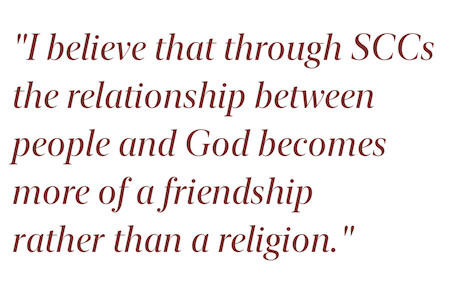 It is through the SCCs that Catholic doctrines are communicated easily, in case of any updates or mistakes realized during church services. A parishioner can be invited to discuss certain issues of Catholic doctrine at the SCC level. Through these discussions, individual members are informed on a high level that emphasizes a hands-on approach to apply faith in real life. Above all, a realization of SCCs as the “spinal cord” of the church brings in the importance of encouraging individuals to participate in SCCs and nurturing the church. I believe that through SCCs the relationship between people and God becomes more of a friendship rather than a religion.
It is through the SCCs that Catholic doctrines are communicated easily, in case of any updates or mistakes realized during church services. A parishioner can be invited to discuss certain issues of Catholic doctrine at the SCC level. Through these discussions, individual members are informed on a high level that emphasizes a hands-on approach to apply faith in real life. Above all, a realization of SCCs as the “spinal cord” of the church brings in the importance of encouraging individuals to participate in SCCs and nurturing the church. I believe that through SCCs the relationship between people and God becomes more of a friendship rather than a religion.
Mary Wahome of Kenya stated that Small Christian Communities are the basis of the larger church; they are “the church at the grassroots” or “the church from below.” For members to even become active in the church, they first begin by being active in an SCC. SCCs have helped in creating a haven for the young people to share freely and express themselves. Most of the time, the people there are almost of the same age and hence contemporaries. They therefore move with the changing times and understand each other properly.
People are free with one another in SCCs because the participants are of similar age and there are no limitations. They are free to express their feelings, ideas, views, and opinions, and to air their grievances without fear. Secondly, SCCs give a sense of belonging and make participants feel at home. Once this sense of belonging is felt, the active participation of young people in the larger church is felt. Most young people are dormant in areas where they feel that they don’t belong. If you want to send a young person away from the church, just place them in a group where they do not find a sense of belonging, such as the Catholic Women’s Association (CWA), Catholic Men’s Association (CMA) or Pontifical Missionary Childhood (PMC).
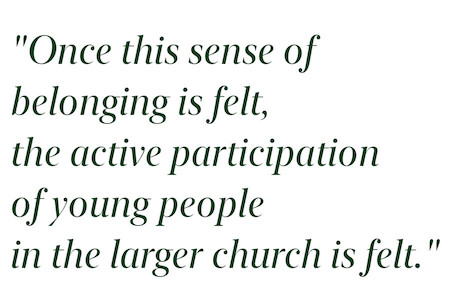 SCCs nurture leaders and leadership. We know that Jesus himself is the head of the church; he is the leader. When he ascended to heaven, he left Peter in charge of the church. There is always a leader in every sector of life. In the same way, there are leaders in these SCCs. The leaders are chosen from amongst the people themselves. Therefore, this nurtures the leadership qualities in those chosen by God, since no leadership and authority exist without God. This is where leaders in the larger church begin. Also, this equips one with certain leadership skills that can rarely be learned in larger church gatherings.
SCCs nurture leaders and leadership. We know that Jesus himself is the head of the church; he is the leader. When he ascended to heaven, he left Peter in charge of the church. There is always a leader in every sector of life. In the same way, there are leaders in these SCCs. The leaders are chosen from amongst the people themselves. Therefore, this nurtures the leadership qualities in those chosen by God, since no leadership and authority exist without God. This is where leaders in the larger church begin. Also, this equips one with certain leadership skills that can rarely be learned in larger church gatherings.
In SCCs, participants learn and acquire skills such as listening to God through Scripture, oneself, and other people, and being confident and a good planner or organizer. I have learned how to live and cope with people of different character traits and cultural backgrounds, and how to be patient and tolerant with others. Moreover, in SCCs people get to share ideas they have and then hear views and opinions from other young people, which helps them make better decisions.
Mary Wahome also mentioned that there is in-depth sharing of the Word of God in SCCs, unlike in larger church gatherings where the priest is the one giving the homily, because each member gets an opportunity to share their understanding of the Word of God. In larger church gatherings, if the members don’t understand what the priest is preaching about, they cannot raise their hands to ask a question.
SCC members share, give ideas, and can even plan events in the SCC, such as works of mercy and ongoing formation programs. They can question what they don’t like and get responses, unlike in the larger church gatherings where the leaders say what has been planned and the rest follow. Also, the members freely express themselves without being limited by factors such as age. In the larger church gatherings, there are people of all kinds: priests, religious women, parents (mothers and fathers), youth, and small children. Some things will not be said, as they may be offensive to the old people or the young ones. Mostly, even young people will be limited in speaking for fear of being judged by their parents.
Another view, which came from Cecilia Ndinda of Kenya, is that in SCCs everyone is allowed to express his or her ideas, share experiences and challenges they face, and come up with practical solutions. That freedom of expression is fully incorporated. In SCCs, there is a sense of belongingness. Everyone feels the positive impact of joining the SCC because it is like a one-family gathering where the facilitator only guides us as we express our views. A family that prays together, for example, was an online retreat that was organized for the Online Young Adult Seekers SCC. From this retreat, we learned a lot, like allowing God to speak to us through listening and not us doing the talking.
Praying for each other is also a great thing for our spiritual growth and life. There’s active participation since one can easily monitor what’s happening around the gathering. In SCCs, the skill of active and attentive listening is well developed as well as communication skills. One can confidently speak and address others with respect. Writing reports after our gatherings helps us to be attentive so as to understand what members say to make a clear report. SCCs like the Online Young Adult Seekers Small Christian Community provide a platform to meet new young people from different parts of the world, connect with them, share experiences, and learn more from each other.
Another SCC participant noted that large church gatherings don’t guarantee everyone the freedom to express their ideas. Only a few ideas are picked from a few people, unlike in SCCs which have a small number of participants who can freely express their ideas and everyone has time to share their thoughts and experiences. If one has a problem in large gatherings, one can’t share it unless they identify a friend to share the problem and maybe come up with different solutions. In SCCs, it’s easy to share a problem, and no one judges you because of the bond that has been created between members. Thus coming up with solutions is very easy.
The large church community involves many people of different ages. It is difficult to identify the best audience to address certain concerns, more so concerns from young people. In SCCs for young people, our ages don’t differ that much, and we come to share our struggles since we all face almost the same challenges. Moreover, it’s not easy to control a large group because it’s difficult for the facilitator to know who is who, their characters, needs, and how to handle them, something which is very easy to do in a SCC.
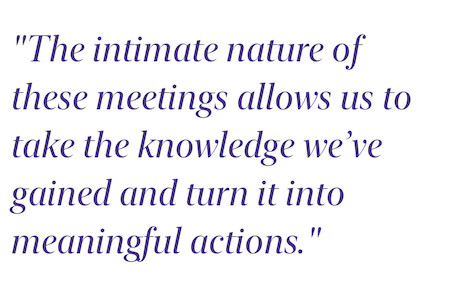 A different point of view comes from Steven Mwanjila of Kenya, who says, “As a young person, Small Christian Communities play a vital role in nurturing and fortifying my faith. These gatherings create a haven where we can put into practice the teachings that have been shared with us in church and catechism. The intimate nature of these meetings allows us to take the knowledge we’ve gained and turn it into meaningful actions, like reading the Bible and praying the rosary, thereby enriching our spiritual journey.
A different point of view comes from Steven Mwanjila of Kenya, who says, “As a young person, Small Christian Communities play a vital role in nurturing and fortifying my faith. These gatherings create a haven where we can put into practice the teachings that have been shared with us in church and catechism. The intimate nature of these meetings allows us to take the knowledge we’ve gained and turn it into meaningful actions, like reading the Bible and praying the rosary, thereby enriching our spiritual journey.
“SCCs also foster a sense of accountability. Being in a setting where I am surrounded by fellow young people encourages me to consistently engage in spiritual practices. This helps solidify our grasp of the concepts we’ve learned during church and catechism sessions. As we gather regularly, we’re able to delve deeper into these teachings, discussing, reflecting, and applying them to our everyday lives, even in a world that seems to be in a constant state of flux with ever-changing trends. In these gatherings, I’ve found a space where I can grow alongside others who share my faith. It’s a place where we can openly share our challenges, doubts, and victories, all while receiving support and insights from fellow young people. It’s through these interactions that we learn to hold one another accountable, ensuring that we don’t just learn about our faith but truly live it out in our actions and decisions.”
Steven also noted that SCCs are much less intimidating to young people. There’s a sense of comfort and safety that comes from being in a smaller setting, where we feel less judged and more understood. This creates an environment where we’re more willing to open up, share our thoughts, and ask questions without fear.
In SCCs for young people, we get a chance to take on active roles that might be less accessible in larger church settings. For instance, we can lead prayers and even take on leadership positions. This level of involvement empowers us to contribute to the group’s dynamics and decision-making, fostering a sense of ownership and responsibility over our faith journey.
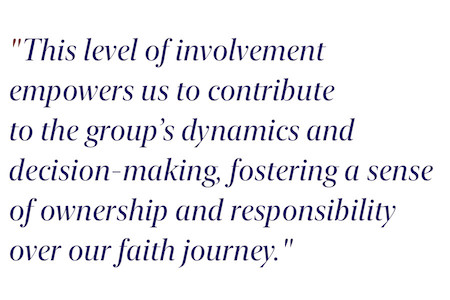 Valentine Mukokho of Kenya noted that meeting in a SCC is important because participants can learn from one another, since people share different ideas from different points of view, making one understand certain concepts better. Secondly, the networking circle of a person is improved through SCCs by meeting people from different tribes and countries. A good example is the Online Young Adult Seekers Small Christian Community that brings young people from more than six countries together. You can interact and share different cultures, making it easy to appreciate different cultures.
Valentine Mukokho of Kenya noted that meeting in a SCC is important because participants can learn from one another, since people share different ideas from different points of view, making one understand certain concepts better. Secondly, the networking circle of a person is improved through SCCs by meeting people from different tribes and countries. A good example is the Online Young Adult Seekers Small Christian Community that brings young people from more than six countries together. You can interact and share different cultures, making it easy to appreciate different cultures.
The self-esteem and confidence of a person are also improved since everyone is allowed to share the agenda of the day. You are also corrected without feeling offended, hence giving the courage to share anytime you’re chosen. Getting an opportunity to run the meeting also gives a sense of recognition that boosts your self-esteem. Our faith in God is also boosted through praying together as one family. Praying the rosary and sharing the Word of God strengthens the bond with God. Holding retreats and fasting sessions allows you to listen to what God is calling us to do as young people.
Leadership, time management, and interpersonal skills are also developed in SCCs. Getting an opportunity to run a meeting gives you the chance to lead and be able to adjourn the meeting within the stipulated time. You also learn how to answer others with respect, and how to organize yourself and attend meetings on time.
For Kristiana Aurel Alua of Indonesia, a member of St. Peter’s Bali Church, a SCC holds deep significance due to its ability to address her unique spiritual and personal needs. SCCs offer a tailored and intimate environment that resonates with her on multiple levels. The SCC provides a sense of belonging in a world often marked by individualism and disconnection. Being part of a close-knit community like an SCC offers her a space where she feels accepted and understood. This sense of belonging is crucial as she seeks to navigate the complexities of life while staying true to her Christian faith.
Kristina appreciates the opportunity for open dialogue and genuine connections within the SCC. In such a small and supportive setting, she feels comfortable sharing her thoughts, questions, and concerns without fear of judgment. This environment encourages her to engage in meaningful discussions about her faith, personal struggles, and aspirations. These conversations not only deepen her understanding of Christianity but also provide her with insights and perspectives from others that enrich her own spiritual journey.
Lastly, a SCC provides her with opportunities for leadership and active involvement. As she takes on roles within the community, she gains confidence, organizational skills, and a deeper sense of responsibility. These experiences equip her with valuable life skills that extend beyond the realm of faith and contribute to her holistic personal development.
In summary, the perspectives shared by members of the Online Young Adult Seekers Small Christian Community through their recent Zoom meeting highlight the profound impact SCCs have on young people’s spiritual growth, personal development, and sense of belonging. Each viewpoint underscores the unique attributes that make SCCs essential to young adults in today’s world. The diverse array of perspectives shared by these young adults reveals that SCCs indeed play a vital role in providing space for nurturing faith, fostering personal growth, building relationships, and encouraging active engagement. Their contributions underline the distinct attributes of SCCs that set them apart from traditional church events, making them indispensable for young adults seeking authentic connections and meaningful spiritual experiences in the contemporary world. ♦
Kristiana Aurel of Bali, Indonesia, is a member of the Online Young Adults Seekers Small Christian Community and the Union of Catholic University Students of the Republic Indonesia (PMKRI). She can be reached at kristianaaurelalua@gmail.com. Alloys Nyakundi of Kisii, Kenya, is a facilitator of the Online Young Adult Seekers Small Christian Communities and a member of Catholic Church Reform International (CCRI) and the St. Isidore International Online Small Christian Community. He can be reached at alloysnyakundi8@gmail.com.

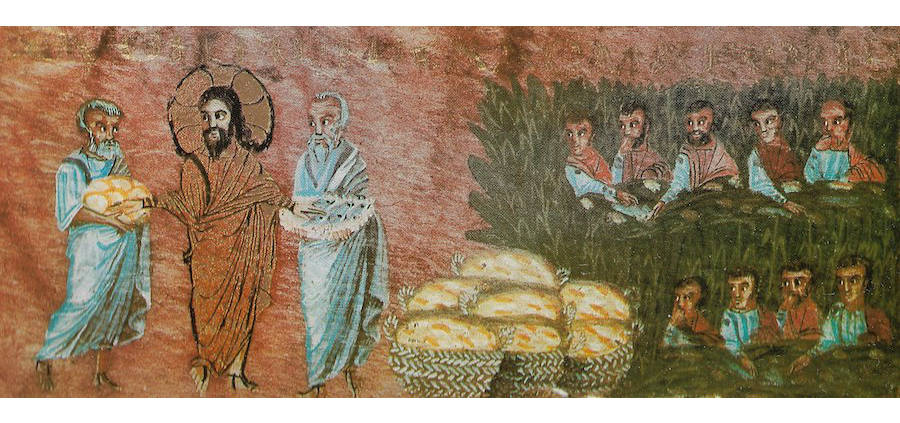



Leave a Reply
Want to join the discussion?Feel free to contribute!